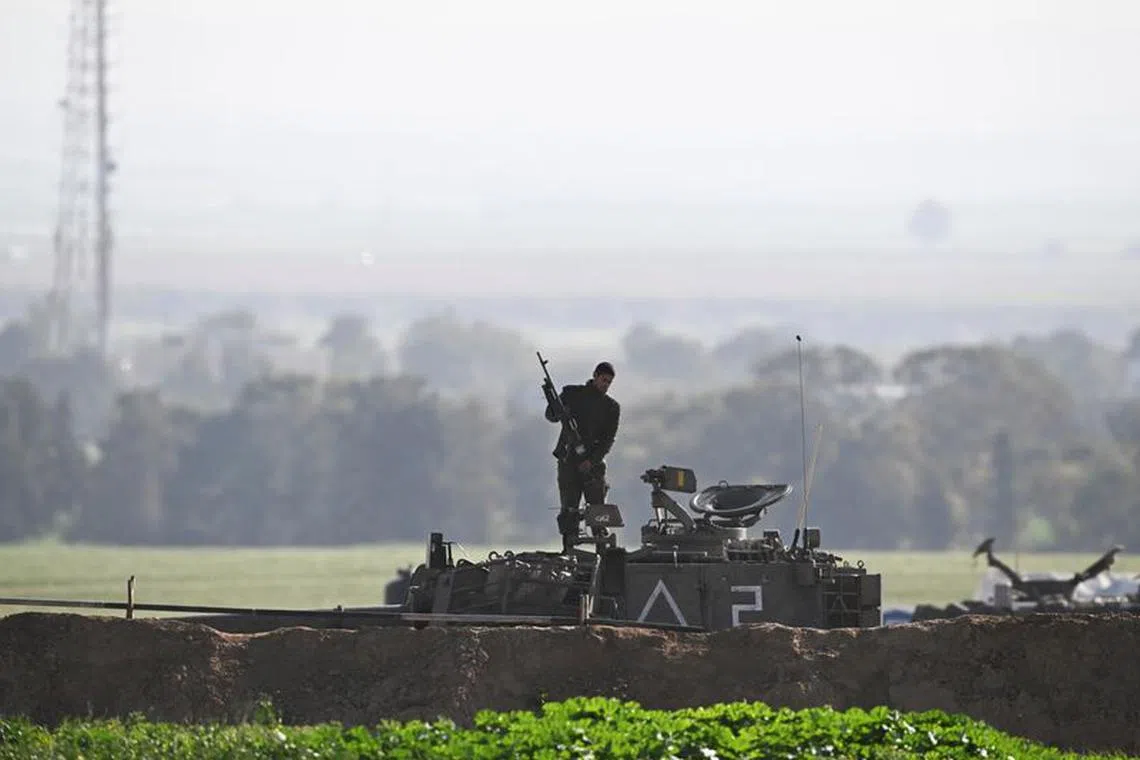Inconclusive Gaza truce talks dent hopes of a million Palestinians sheltering in Rafah
Sign up now: Get ST's newsletters delivered to your inbox

In the last 24 hours, 103 Palestinians were killed and 145 injured, the Health Ministry in Gaza said.
PHOTO: REUTERS
Follow topic:
CAIRO – Palestinians jammed into their last refuge in Gaza voiced growing fear on Feb 14 that Israel would soon launch a planned assault on the southern city of Rafah, after truce talks in Cairo ended inconclusively.
The talks in the Egyptian capital, involving the United States, Israel, Egypt and Qatar, ended without any sign of a breakthrough
The lack of an agreement has dealt a new blow to the more than one million Palestinians crammed into Rafah, next to the border with Egypt, where many are living in tent camps and makeshift shelters after fleeing Israeli bombardments elsewhere in Gaza.
The Israeli military says it wants to flush out Islamist militants from hideouts in Rafah and free hostages being held there
“The news was disappointing. We hoped there could be a deal reached in Cairo. We are now counting down the days before Israel sends in tanks. We hope they don’t, but who can prevent them?” Mr Said Jaber, a Gaza businessman who is sheltering in Rafah with his family, told Reuters via a chat app.
In the latest international plea for Israel to hold off on an assault on Rafah, the World Health Organisation (WHO) warned of the danger of pushing Gaza’s health system closer to collapse.
“Military activities in this densely populated area would be, of course, an unfathomable catastrophe, and would even further expand the humanitarian disaster beyond imagination,” said Mr Richard Peeperkorn, WHO representative for Gaza and the West Bank.
German Foreign Minister Annalena Baerbock, who was expected to hold talks with Israeli Prime Minister Benjamin Netanyahu on Feb 14, said an Israeli army offensive on Rafah would “completely jeopardise the humanitarian situation”.
“Because the people in Rafah cannot simply vanish into thin air. They need safe places and safe corridors to avoid being caught in the crossfire even more. They need more humanitarian aid. And they need a ceasefire,” she said in a statement released in Berlin.
War goes on
Meanwhile, Israeli forces shelled eastern areas of Rafa overnight, Palestinian witnesses said.
Israeli planes and tanks pounded several areas of Khan Younis in southern Gaza, and there was heavy fighting in some parts of the city, residents said.
The Health Ministry in the Hamas-governed enclave said Israeli forces were continuing to isolate the two main hospitals in Khan Younis, and that sniper fire at the city’s Nasser Hospital had killed and wounded many people in recent days.
Speaking in a video from inside Nasser Hospital, one doctor said the facility had been under siege by Israeli forces for 22 days and that bulldozers protected by tanks had knocked down the hospital’s northern gate.
“A state of panic prevailed this morning as we woke up today to the sounds of powerful explosions and bombardments near the northern area of the hospital. It is dreadful, food is in short supply,” Dr Haitham Ahmed said in the video, which Reuters could not immediately verify.
Rafah residents said on Feb 13 that dozens of displaced people had begun to leave Rafah after Israeli shelling and air strikes in recent days.
Rafah neighbours Egypt, but Cairo has made clear that it will not allow a refugee exodus over the border.
At least 28,576 Palestinians have been killed and 68,291 injured in Israeli strikes on Gaza since Oct 7, the Health Ministry in Gaza said on Feb 14.
In the last 24 hours, 103 Palestinians were killed and 145 injured, the ministry’s statement added.
Many other people are believed to be buried under the rubble of destroyed buildings across the densely populated Gaza Strip, much of which is in ruins. Supplies of food, water and other essentials are running out, and diseases are spreading.
The war in Gaza has raised fears of conflict spreading across the Middle East, and heightened tension along Israel’s northern border with Lebanon.
Israel’s military said on Feb 14 it responded to cross-border rocket fire from Lebanon that injured seven people in northern Israel.
A security source in Lebanon said Israeli strikes had already hit at least three towns in southern Lebanon, but gave no details of any damage or casualties.
Inconclusive truce talks
Egypt’s President Abdel Fattah al-Sisi met US Central Intelligence Agency director William Burns and Qatar’s Prime Minister Mohammed bin Abdulrahman Al Thani at talks on Feb 13 aimed at agreeing on a Gaza truce, protecting civilians, and delivering more aid into the enclave, Egypt’s state information service said.
It said in a statement that there was a “keenness to continue consultation and coordination” on the main issues, indicating that no breakthrough was made.
The statement made no mention of Israel. The Israeli delegation left Cairo for home, a Reuters reporter said. Mr Netanyahu’s office did not respond to a request for comment.
One source briefed on the talks described them as “good” and said all sides agreed to continue them, but declined to say where or when.
A Palestinian official said Egypt and Qatar would continue talking to the warring sides separately.
“There is no option but to continue efforts to bring an end to this war. This is the common position by the Qataris and the Egyptians, and the Americans support it,” the official said, urging Israel to soften its stance.
Israel has vowed to fight on until it eradicates Hamas and has made the return of the last hostages a priority. Hamas says Israel must commit to ending the war and withdrawing from Gaza. REUTERS

